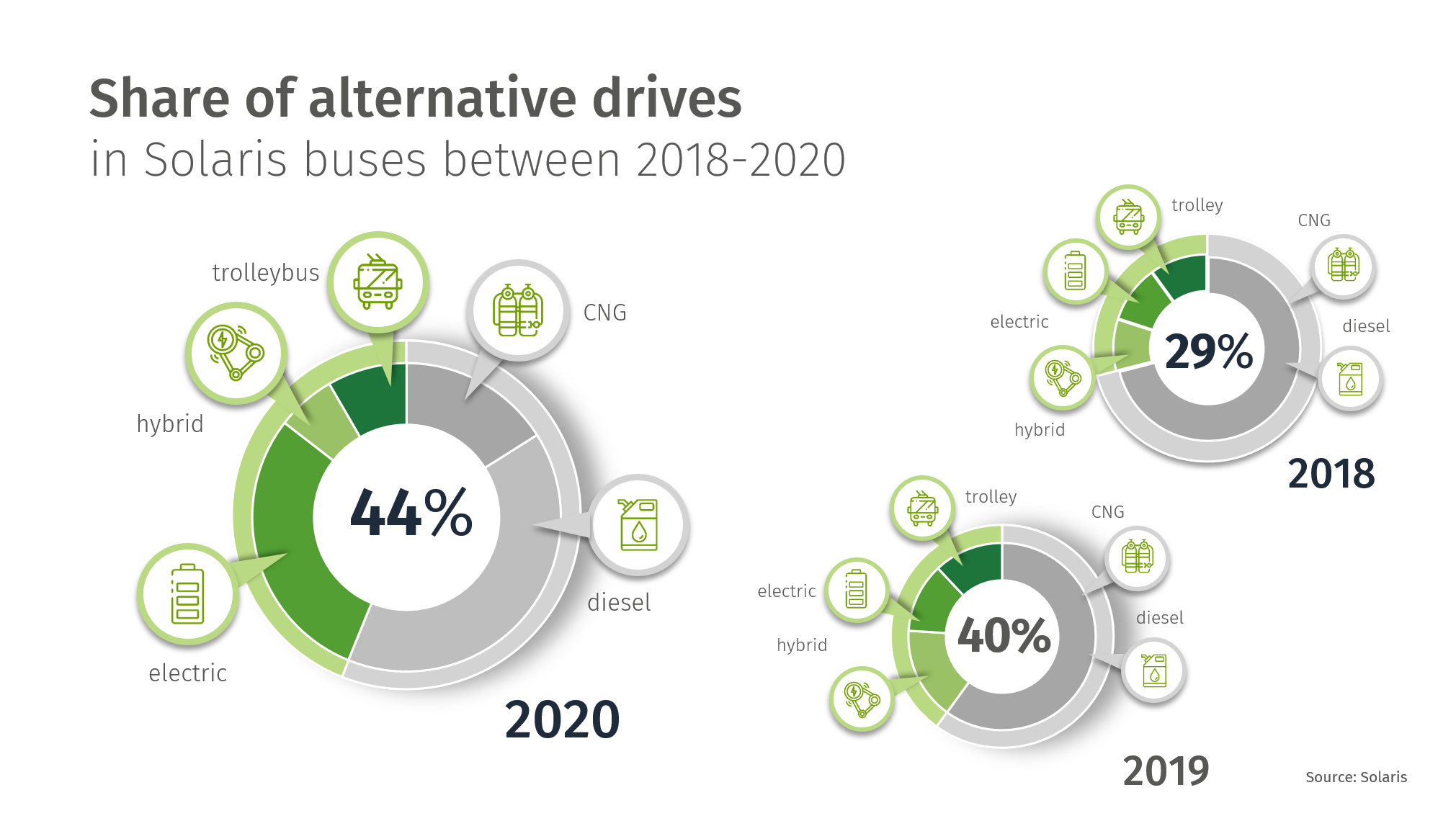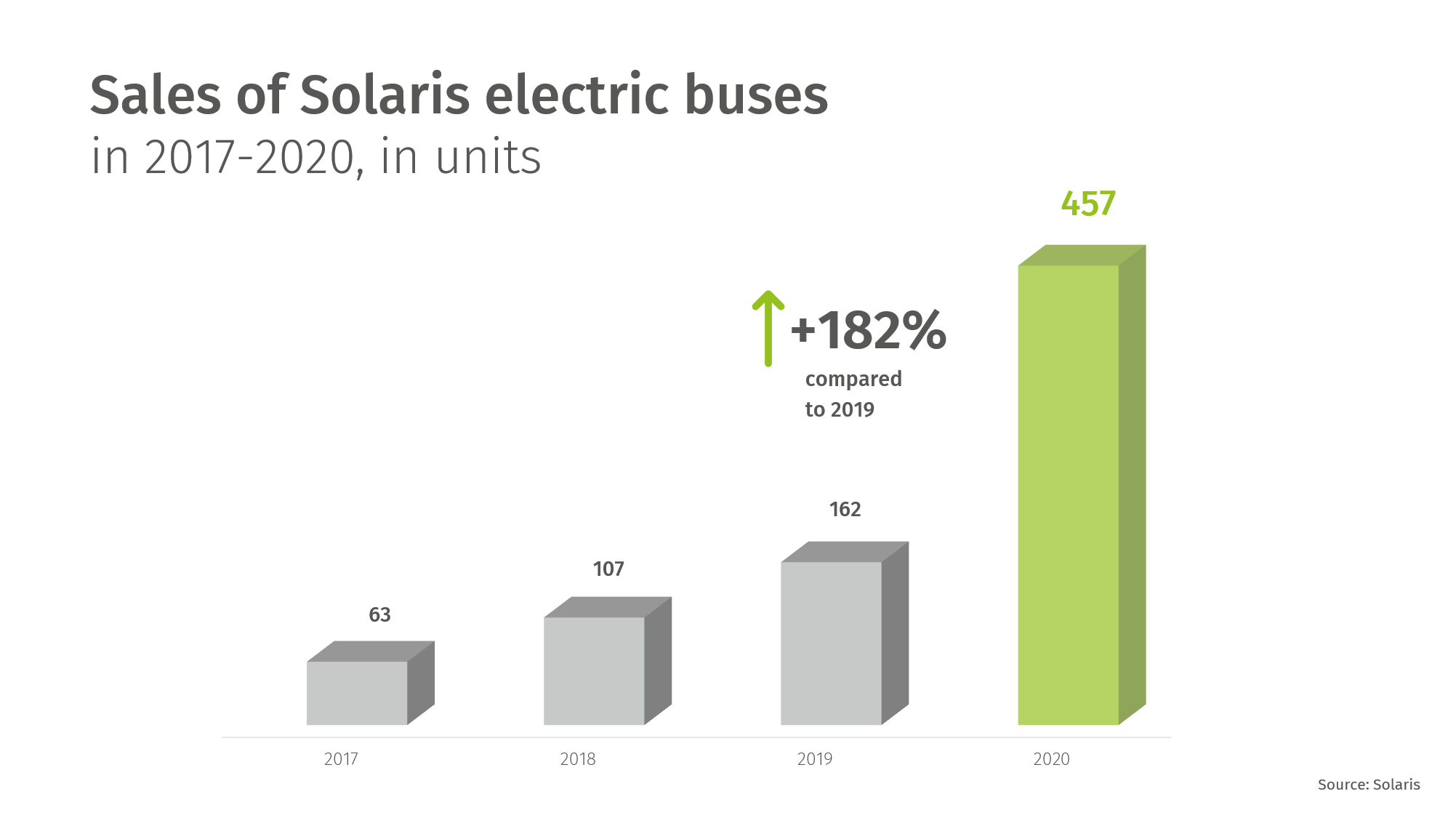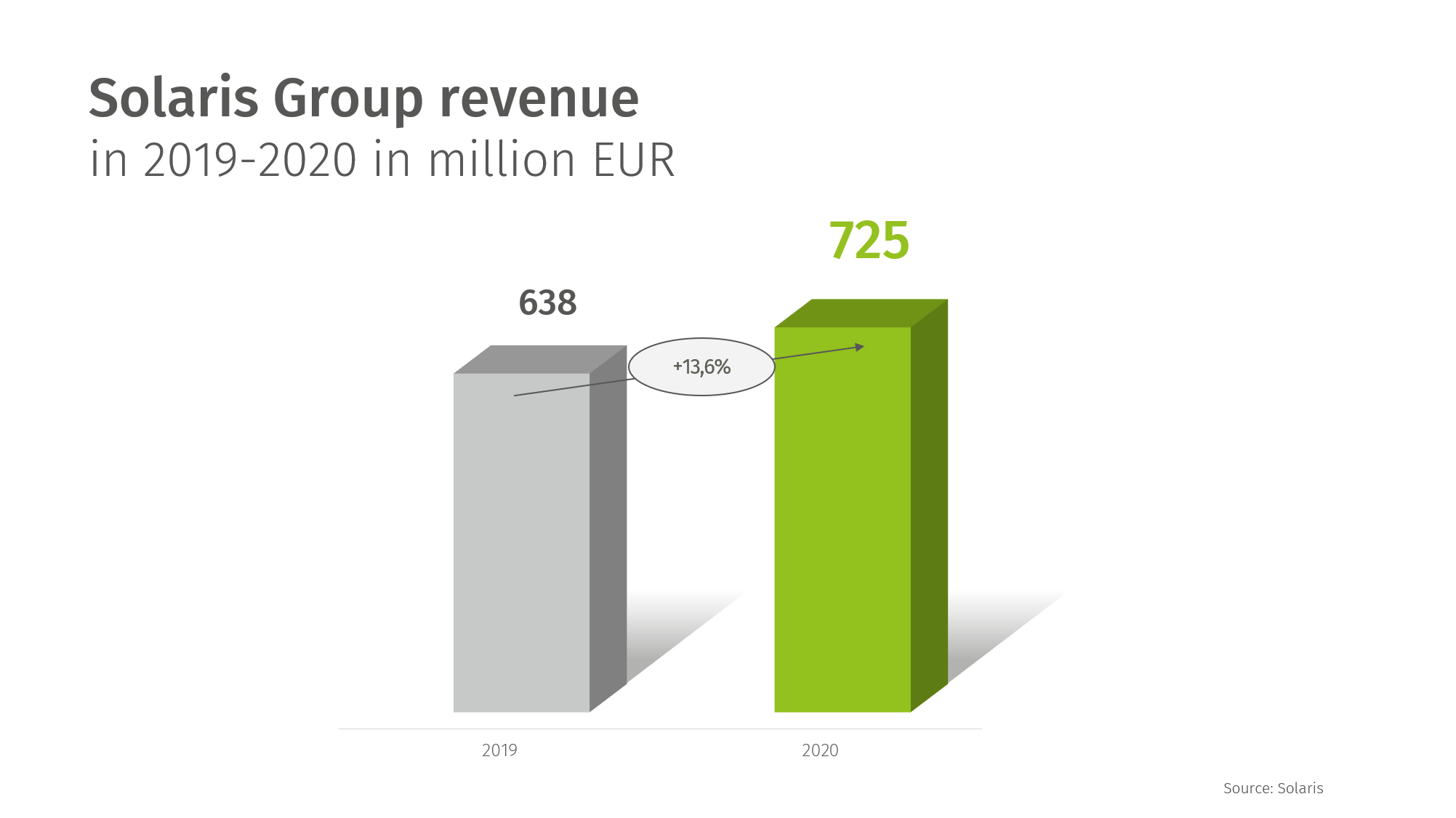• Solaris ranked first in Europe when it came to the number of delivered electric buses • The bus manufacturer racked up record sales of 1560 vehicles in 2020 • Solaris reported an increase in revenues of 13,6 percent hitting 725 mil EUR • Orders for hydrogen-fuelled buses surged
In 2020, most economies in the world had to face unprecedented challenges. The past few months have also been difficult for the European public transport sector and companies manufacturing vehicles in this sector of the automotive industry. The Covid-19 pandemic and related restrictions prompted Solaris to establish special procedures and to develop solutions to maintain the continuity of its business activities. However, the company has proved that, even in the toughest of times, it keeps promises made to its clients and business partners. The great deal of effort the whole organisation and its employees have put into continuing its activities and implementing protective measures have thus yielded tangible results.
Last year Solaris recorded a substantial increase in sales and revenues and, what is more, all these were record numbers. In 2020, a new record for the number of sold vehicles was established, 1560 units, which is the highest number ever achieved in Solaris’ 25-year history. Compared to 2019, this represents a rise of nearly 5% (1487 units in 2019).

Fig. 1. Sales of Solaris vehicles from 2017 to 2020, in units, source: Solaris.
In the period in question, Solaris buses and trolleybuses made their way to carriers in 19 countries. The largest numbers of vehicles were delivered in 2020 to Germany, Poland, Italy, Estonia, Czech Republic, Israel, Switzerland and Spain.
Moreover, 2020 was a record year for Solaris in terms of the number of vehicles sold in Germany. The bus manufacturer supplied a total of 329 vehicles to German public transport operators, out of which 40% were 12- and 18-metre (articulated) battery electric buses.
Also worthy of note is that Solaris became the market leader for low-floor city buses in Poland for the 18th year in a row, by achieving a 53% share in this segment. This translates into a year-on-year increase in the company’s market share in Poland of 11% (41% in 2019). The Solaris buses sold in Poland in 2020 included primarily electric buses (194 out of 365 units sold in total). The whole fleet of Urbino electric buses in Poland amounts to over 320 vehicles, supplied to 27 towns and cities, i.e. they make up as much as 90% of all e-buses in the country.
Importantly, last year Solaris recorded a particularly impressive growth in sales of buses with low- and zero-emission drives. In 2018, hybrid buses, e-buses and trolleybuses constituted in total 29% of all vehicles sold by the manufacturer. In 2019, this figure stood at 40%. This trend was continued in 2020 leading to the number of sold vehicles with alternative drives growing to up to 44%. Dynamic growth in the share of electric buses in the production and sales mix of Solaris is consistent with the long-term development strategy of the firm, as well as of the whole CAF Group, which has been the owner of Solaris since 2018.

Fig. 2 Share of individual alternative drives in the sales structure in 2020, 2019 and 2018, source: Solaris.
In 2020, Solaris was the largest manufacturer of city e-buses in Europe, claiming a share of 20%. Last year, the company supplied a total of 457 electric buses measuring 12 and 18 metres. This was nearly three times more than in the previous year, when 162 Urbino electric units, made their way to clients.

Fig. 3. Sales of Solaris electric buses from 2017 to 2020, source: Solaris.
The biggest contracts for the supply of electric buses executed in 2020 included a delivery of 130 articulated Solaris Urbino electric buses for public transport operator Miejskie Zakłady Autobusowe in Warsaw, 90 Solaris Urbino electric buses for operator ATM in Milan, and 106 e-buses for Berlin-based public transport company BVG.
Also noteworthy is the fact that the jubilee Urbino bus, i.e. the 20,000th vehicle produced since 1996 (i.e. since the founding of the company), was one of the 130 e-buses delivered to operator MZA in Warsaw. So far, Solaris buses have been delivered to 32 countries and over 750 towns and cities. The impressive number of 20,000 consists of, among other things, over 1000 e-buses that already cruise along streets in 18 countries, operated by almost 100 European carriers.
The higher share of innovative battery and hybrid technologies in the sales volume in 2020, as well as the company’s intensified activities in the areas of after sales service and spare parts sales, are reflected in a considerable increase in the company’s revenues. Last year, they amounted to over 725 mil EUR, which means that they grew by 13,6% year-on-year (638 mil EUR in 2019).

Fig. 4. Solaris Group revenue in the years 2019 and 2020 in million EUR, source: Solaris.
In 2020, the manufacturer won significant tenders for the delivery of electric buses in 2021 or later. The order book for 2021 contains, among other things, 50 articulated Urbino electric buses for operator MPK in Cracow, 37 e-buses for operator MPK Poznań, and 16 zero-emission buses for the Romanian city of Craiova. Solaris also made it onto the shortlist of suppliers to deliver up to 530 electric buses for German operator Hamburger Hochbahn. The carrier from Hamburg only placed its first order for 10 electric buses in 2020. In 2021 Solaris ebuses will be also delivered to operators from France, Latvia, Netherlands, Spain, Italy and Switzerland.
The contribution of Solaris to the development of the e-mobility market was appreciated in 2020, for instance, by the organisers of the Global E-mobility Forum. During the event, which gathered representatives of governments, scientists and world industry leaders, the company was awarded the title of Global E-mobility Leader 2020.
Solaris has been strengthening its position as Europe’s e-mobility leader not only through the development of electric battery vehicles, but also by investing consistently and in the long term in the perfection of solutions implemented in hydrogen buses. The manufacturer believes that the development of all e-mobility branches, be they battery buses, trolleybuses or hydrogen-fuelled vehicles, should proceed in synergy, and that this process is part and parcel of ensuring sustainable transport for the future. Currently, Solaris offers its clients a comprehensive emission-free bus portfolio thanks to which Solaris is ready to meet not only today’s challenges of ensuring sustainable public transport but also the diverse needs of carriers, passengers and drivers.
According to market forecasts, the hydrogen-fuelled city bus segment will grow dynamically in Europe over the next 10 years. Having won several significant tenders for the delivery of hydrogen vehicles in 2020, the company has proved that it is ready for the market’s fast-changing needs. The bus maker secured orders for the supply of hydrogen buses from operators in the Germany, Netherlands, Italy and Sweden.
The development of new products and commencing their serial production, as well as the sale of cutting-edge solutions, are naturally key elements that account for Solaris‘ market advantage in Europe. In 2020, the company presented a completely new type of electric bus measuring 15 metres. The low-entry Solaris Urbino 15 LE electric bus opens a new chapter in the development of the Solaris brand, as from now on the Urbino electric can go beyond city boundaries. This is also a breakthrough moment for intercity transport as regards its transition to emission-free mobility. The tri-axle Urbino bus is the first product in Solaris’ electric range that meets the requirements for both the first and second vehicle class, and also for both these classes at the same time. This means that the bus can be operated both as a city bus and on intercity routes. Thanks to the batteries’ high energy density, the vehicle can cover a distance of up to several hundred kilometres on a single charge in real-life conditions. This solution will make it possible for operators to plan zero-emission routes not only within city confines but also beyond them.
Another brand new product unveiled by Solaris last year was a mild hybrid model. Diesel-electric drives as such are nothing new in the Solaris range. The first Urbino hybrid bus was unveiled in 2006. Back then, Solaris was the first European producer to offer a serially produced bus with a hybrid (diesel-electric) drive. However, the mild hybrid is a novel solution. It is a response to the needs of public transport operators for innovative urban transport vehicles which minimise the impact of such transport on the natural environment, while at the same time allowing them to reduce fuel consumption and to generate considerable savings. This type of drive was developed by using recuperation technology in buses - a technology that uses energy generated during braking. Thanks to it, mild hybrid vehicles release less pollutants and are more environmentally friendly than required according to restrictive Euro 6 emissions standards for diesel engines. The launch of the mild hybrid model has enriched Solaris’ existing portfolio when it comes to low-emission vehicles: the Urbino hybrid and the Urbino CNG.
The year 2020 and the COVID-19 pandemic posed new challenges to many companies from the public transport sector. For public transport operators, new needs concerning improving the safety of passengers and drivers have emerged. Solaris responded to these needs very swiftly and in July 2020 it unveiled an “anti-coronavirus” package to minimise the risk of infection among those who have to travel during the pandemic. The solutions have been devised for both newly manufactured vehicles, as well as those which have already been delivered to clients. Special solutions offered by the manufacturer include:
- Hands-free opening and closing of doors for passengers - this amenity is based on through-beam sensors detecting people who want to either get on or off the bus. From their panel, the driver permits the opening or closing of the doors, which will respond automatically, without the need for passengers to press a stop button.
- Disinfectors - it is possible to attach hand disinfectant dispensers to the rails inside of the bus. On one refill, the disinfector can deliver 3000 doses, while being easy to use and consuming little energy. There can be several such devices installed in one vehicle, depending on the interior layout.
- Intercom - a non-contact passenger-driver communication system - in order to keep direct contact between drivers and passengers to a minimum, buses can also be fitted with an intercom. Thanks to this system, it is possible to comply with social distancing rules even when talking to the driver.
- Passenger counting system - during the epidemic, in many countries operators have been forced to limit the number of passengers allowed to travel at one time on a public transport vehicle. In order to inform both drivers and passengers as to the number of passengers currently onboard the bus, and how many more passengers may still embark, the carrier can opt for
a passenger counting device. The system is located near the vehicle door and it automatically collects data on the number of travellers, registering each bus entry and exit in the process. Information about the current number of passengers can be displayed both on the driver’s panel, as well as on external or internal notice boards.
- Closed drivers’ cabins - bearing in mind the day-long labour of drivers, Solaris has devised
a closed cabin version, in order to ensure comfortable and safe work conditions. The cabins provide separate air-conditioning and ventilation systems for drivers; these minimise the possibility of air circulation between the cabin and the passenger compartment. The driver can have a separate entrance / exit at their disposal, which means less direct contact with passengers.
All of the proposed solutions have already been tested in real-life urban conditions. What is more, Solaris has also drafted detailed recommendations for its clients regarding the use and maintenance of ventilation and air-conditioning in buses. These concern, among other things, the frequency and manner of washing and of disinfecting the air-conditioning, or the exchange of filters and the compatible types. Thanks to these instructions, it is possible to enhance the safety of passengers and to limit the risk of spreading infections in the bus.
In addition to new products that Solaris launched on the market in 2020, a development project initiated by the company called “A second lease of life for batteries” is also worth mentioning. A consortium comprised of Solaris and Impact Clean Power Technology S.A., in collaboration with TAURON Polska Energia, will implement a project titled “Second Life ESS” with the aim of creating a prototype system to store electric energy based on retired bus batteries. The project is being co-financed by the National Centre for Research and Development [NCBiR]. The aim of the project is to utilise lithium-ion cells whose parameters are no longer optimal when it comes to supplying power to vehicles. But thanks to their integration in energy storage systems, they may gain a second lease of life. Thus, the life cycle of batteries that are not disposed of, but reused, is prolonged. A storage system made of used batteries constitutes an important component of the modern grid, combining the generation of energy from conventional and renewable sources with its storage and supply to the final customer. What is more, modern battery storage solutions contribute to grid stability, with a steadily increasing share of renewable energy sources. They also boost the quality of electricity supplied and support the development of e-mobility and micro-grids. The work, aimed at developing an energy storage prototype system, is due to be completed in 2022.
“The year 2020 was a time of unprecedented challenges for many companies, including those from the public transport sector. Even though the continent had to deal with the pandemic from the beginning of the year, Solaris made every endeavour to maintain the continuity of its business activities. Owing to the fantastic and responsible attitude of our employees as well as excellent collaboration with our clients and business partners, we finished this year with record sales numbers. We have proved to our clients that they can rely on our company even in the toughest of times. I rest assured that we will overcome this difficult time for the whole industry and we will emerge from this experience stronger”, said Javier Calleja, CEO of Solaris, summing up the year 2020.
Information Solaris
Additional information
Mateusz Figaszewski
Institutional Partnerships and External Relations Director
mateusz.figaszewski@solarisbus.com

































